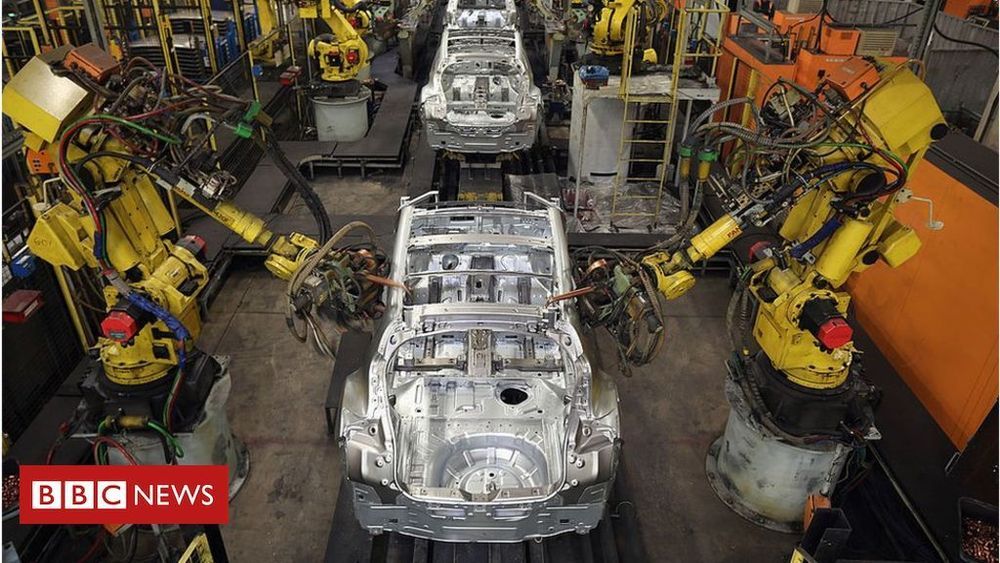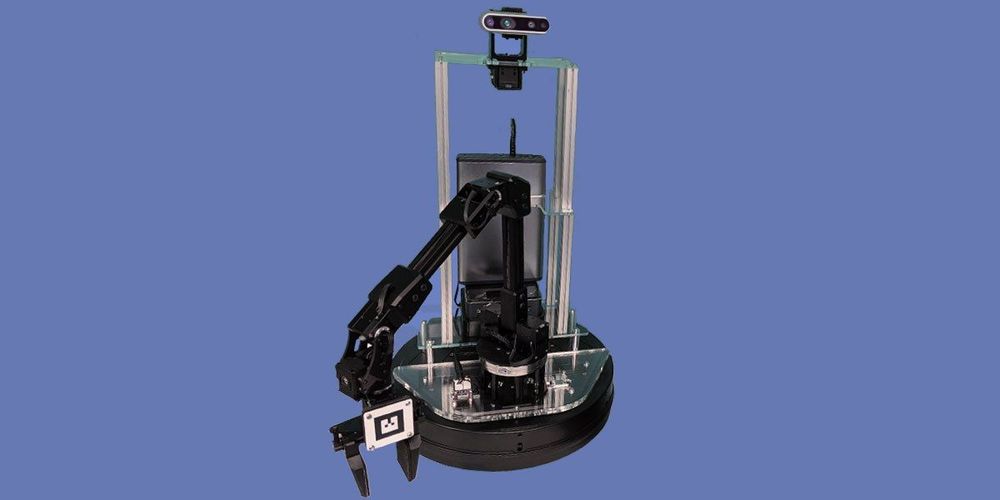A huge acceleration in the use of robots will affect jobs around the world, Oxford Economics says.



Anyone who tells you the robot apocalypse is upon us—that the machines will not stop stealing our jobs, that they are gearing up to chase us through the streets while doing backflips and fighting off stick-wielding humans—has never tried to program a robot. It’s difficult to get a machine to do so much as move an arm, which requires the precise control and coordination of joint angles and torque.
The difficulty of programming robots is a problem that Facebook, of all companies, wants to fix. Today the social network continues its unlikely dive into robotics by open-sourcing a new robot framework, known as PyRobot, that could simplify the way researchers program their machines, and could even make it easier for non-robotics types to jump into the field. If programming robots has so far been something like wading through a command-line interface, PyRobot promises to be like gliding through the sleekness of macOS. At least, that’s the hope: Many others have tried and failed to do this kind of thing.

Nichol Bradford, MBA, is the CEO & Founder of the Willow Group and the Executive Director and co-founder of the Transformative Technology Lab, Conference, and TT200 List. Prior to becoming a leader in Transformative Technology, Bradford was a senior executive in video games with responsibility for strategy, operations and marketing for major brands that include: Activision Blizzard, Disney, and Vivendi Games — including operating World of Warcraft China. Nichol is a graduate of Singularity University GSP15, has an MBA from Wharton School of Business in Strategy. She is author of a novel, The Sisterhood.
Here she describes developments in the emerging industry of transformative technology. She points out that, in the next 25 years, enormous numbers of jobs will be displaced by automation. This challenge, and others, make it essential that people large numbers of people actualize more of their innate potential. Technology can assist in this process — particularly when it is scalable and can be afforded by the millions. She emphasizes a variety of technological advances while emphasizing the importance of ethics, privacy, and data sovereignty.
New Thinking Allowed host, Jeffrey Mishlove, PhD, is author of The Roots of Consciousness, Psi Development Systems, and The PK Man. Between 1986 and 2002 he hosted and co-produced the original Thinking Allowed public television series. He is the recipient of the only doctoral diploma in “parapsychology” ever awarded by an accredited university (University of California, Berkeley, 1980).
(Recorded on February 18, 2019)
For a complete, updated list with links to all of our videos, see https://newthinkingallowed.com/Listings.htm.
For opportunities to engage with and support the New Thinking Allowed video channel — please visit the New Thinking Allowed Foundation at http://www.newthinkingallowed.org.
Thousands of tech fans descended on the Mojave desert for the conference, a public offshoot of Amazon Chairman Jeff Bezos’ previous invitation-only MARS conferences (the acronym stands for “Machine Learning, Robotics, Automation and Space”).
It resembled a tech summer camp, replete with offerings of cutting-edge technology demos, talks and social events.
In dozens of breakout sessions, business leaders discussed the future of jobs, drones, and tools powered by Amazon’s cloud platform in fields ranging from space exploration to health care.

The way information travels inside the cells of our bodies is not unlike the wiring inside a computer chip, according to a new study that has unveiled the intricate workings of a network of calcium ions as intracellular messengers.
According to researchers from the University of Edinburgh in the UK, this “cell-wide web” uses a microscopic network of guides to transmit information across nanoscale distances and carry activities and instructions for the cells to perform — such as relaxing or contracting muscles, for example.
Calcium ions (Ca2+) are a fundamental part of the messaging system of our cells, and their signals are crucial for a wide variety of jobs, including cell growth, death, and movement. Now researchers have taken an unprecedented close look at just how calcium ions shuttle messages within the cell.

The Cyborg and Transhumanist Forum at the Nevada Legislature on May 15, 2019, marked a milestone for the U.S. Transhumanist Party and the Nevada Transhumanist Party. This was the first time that an official transhumanist event was held within the halls of a State Legislature, in one of the busiest areas of the building, within sight of the rooms where legislative committees met. The presenters were approached by tens of individuals – a few legislators and many lobbyists and staff members. The reaction was predominantly either positive or at least curious; there was no hostility and only mild disagreement from a few individuals. Generally, the outlook within the Legislative Building seems to be in favor of individual autonomy to pursue truly voluntary microchip implants. The testimony of Anastasia Synn at the Senate Judiciary Committee on April 26, 2019, in opposition to Assembly Bill 226 — https://www.youtube.com/watch?v=kXGessk5c24 — is one of the most memorable episodes of the 2019 Legislative Session for many who heard it. It has certainly affected the outcome for Assembly Bill 226, which was subsequently further amended to restore the original scope of the bill and only apply the prohibition to coercive microchip implants, while specifically exempting microchip implants voluntarily received by an individual from the prohibition. The scope of the prohibition was also narrowed by removing the reference to “any other person” and applying the prohibition to an enumerated list of entities who may not require others to be microchipped: state officers and employees, employers as a condition of employment, and persons in the business of insurance or bail. These changes alleviated the vast majority of the concerns within the transhumanist and cyborg communities about Assembly Bill 226.
This Cyborg and Transhumanist Forum comes at the beginning of an era of transhumanist political engagement with policymakers and those who advise them. It was widely accepted by the visitors to the demonstration tables that technological advances are accelerating, and that policy decisions regarding technology should only be made with adequate knowledge about the technology itself – working on the basis of facts and not fears or misconceptions that arise from popular culture and dystopian fiction. Ryan Starr shared his expertise on the workings and limitations of both NFC/RFID microchips and GPS technology and who explained that cell phones are already far more trackable than microchips ever could be (based on their technical specifications and how those specifications could potentially be improved in the future). U.S. Transhumanist Party Chairman Gennady Stolyarov II introduced visitors to the world of transhumanist literature by bringing books for display – including writings by Aubrey de Grey, Bill Andrews, Ray Kurzweil, Jose Cordeiro, Ben Goertzel, Phil Bowermaster, and Mr. Stolyarov’s own book “Death is Wrong” in five languages. It appears that there is more sympathy for transhumanism within contemporary political circles than might appear at first glance; it is often transhumanists themselves who overestimate the negativity of the reaction they expect to receive. But nobody picketed the event or even called the presenters names; transhumanist ideas, expressed in a civil and engaging way – with an emphasis on practical applications that are here today or due to arrive in the near future – will be taken seriously when there is an opening to articulate them.
The graphics for the Cyborg and Transhumanist Forum were created by Tom Ross, the U.S. Transhumanist Party Director of Media Production.
Become a member of the U.S. Transhumanist Party / Transhuman Party free of charge, no matter where you reside: https://transhumanist-party.org/membership/
References
Gennady Stolyarov II Interviews Ray Kurzweil at RAAD Fest 2018 — https://www.youtube.com/watch?v=10dFgrjdfqY
